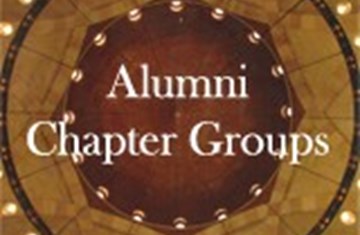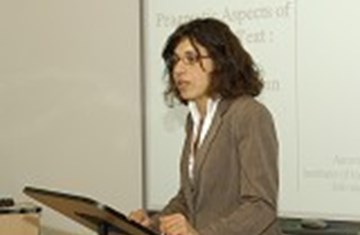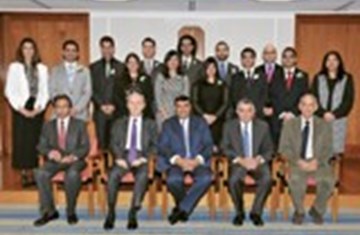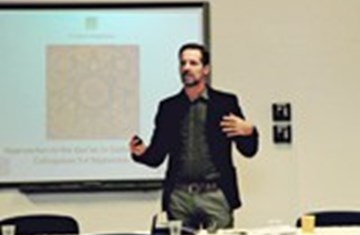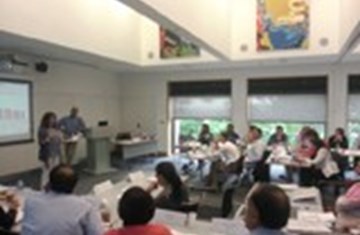Qur’anic Studies scholars present papers at the American Oriental Society Meeting, 2013
Four scholars from the Qur’anic Studies Unit at the IIS, Drs Nuha Al-Sha’ar, Karen Bauer, Stephen Burge and Asma Hilali, presented papers at the 223rd American Oriental Society meeting. This year’s meeting was held in Portland, USA, between 15 and 18 March 2013, and was attended by over 150 academics from across the globe.
Dr Nuha Al-Sha’ar presented a paper entitled ‘The Use of the Qur’an in Andalusian Poems (Muwashshahat) of the Thirteenth Century: A Case Study of Ibn Sahl al-Ishbili’.
Dr Al-Sha’ar commented on how little attention has been paid to the religious components of the muwashshahat, especially regarding its Qur’anic themes and their functions in the text. She sought to set this right by providing a case study of some of the muwashshahat by Abu Ishaq Ibrahim Ibn Sahl al-Isra’ili al-Ishbili (died ca. 1250). He was a convert to Islam from Judaism, who is considered one of the greatest poets of al-Andalus.
Dr Karen Bauer presented a paper entitled ‘Women’s Rights are Like their Duties bi’l-ma’ruf: The Ethical Treatment of Wives in Classical Tafsir and Marriage Contracts’. Dr Bauer noted that classical Islamic marital ethics has come under heavy scrutiny in recent years, with authors particularly focusing on the inequalities between husbands and wives. She pointed to Kecia Ali’s study of Hanafi, Shafi'i and Maliki juridical opinions of marriage and divorce, and the jurists’ justifications for their rulings, which shows that notions of equality in marriage that are common in some parts of the world today are not reflected in Classical Islamic juridical opinions on the role of husband and wife.
Dr Stephen Burge presented a paper entitled ‘Al-Suyuti:Hadith, Politics, Power, and “People Control”’. Dr Burge provided a survey of the works of Jalal al-Din al-Suyuti (d. 911/1505) and argued that many of them can be viewed as means to control the masses. He noted that al-Suyuti sought to influence the religious and social practices of the masses by accommodating popular aspects of culture into normative Islam.
Dr Asma Hilali presented a paper entitled ‘The Oldest Manuscript of the Qur’an: An Edition and Commentary on Selected Passages of the Qur’an Manuscript 27.1 Dar al-Makhtutat, Yemen’. In her paper, Dr Hilali provided a summary of the oldest fragments of this Qur’an manuscript, which was discovered in 1979. Dr Hilali described the page as containing two layers of Qur’anic texts, an initial layer which had been deleted and replaced with a second layer. In her presentation she discussed the problematic passages of the manuscript (folios 5a; 5b; 6a; 11b; 21a) and presented the particularities of each passage, focusing on the problem of the Qur’anic variants (additions/omissions, ‘extra-qur’anic’ texts). Based on these particularities, Dr Hilali presented conclusions related to the manuscript’s use and status.
The meeting is an annual event, hosted by The American Oriental Society, the oldest learned society in the United States devoted to basic research in the languages and literatures of Asia. It includes such subjects as philology, literary criticism, textual criticism, paleography, epigraphy, linguistics, biography, archaeology, and the history of the intellectual and imaginative aspects of Oriental civilisations, especially of philosophy, religion, folklore and art.
Further details of the papers presented can be found here.
Related Pages on the IIS Website:
- News Archive, 2012: IIS Research Associate Presents Paper at Annual Meeting of American Oriental Society
- Academic Article: Al-Suyuti on the Merits of Imam ‘Ali by Dr Stephen Burge
- News Archive, 2009: Dr Karen Bauer Presents Paper on “Tafsir and its Audience”

